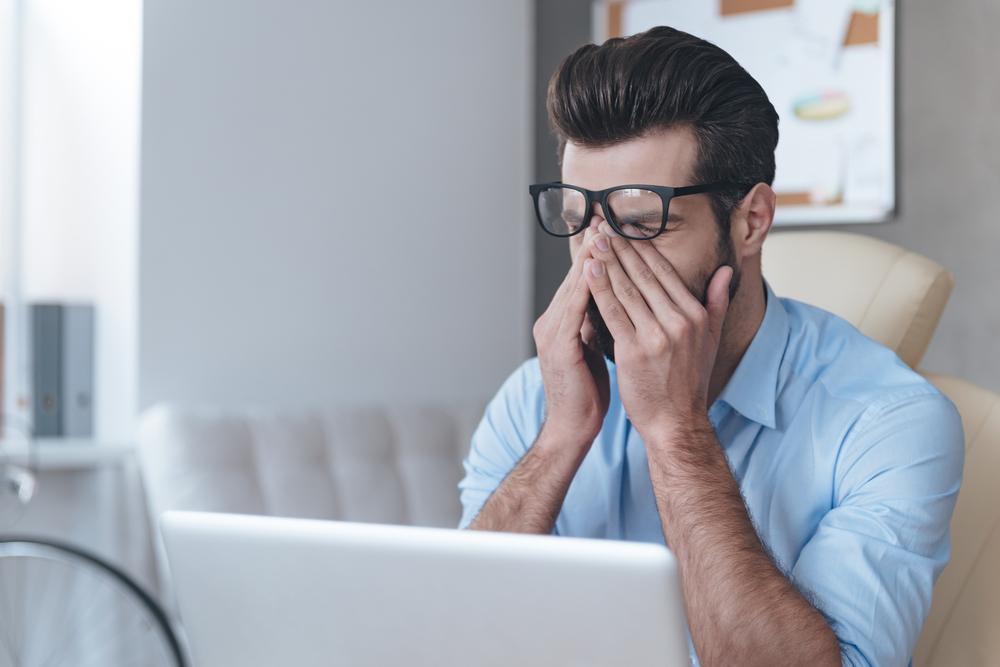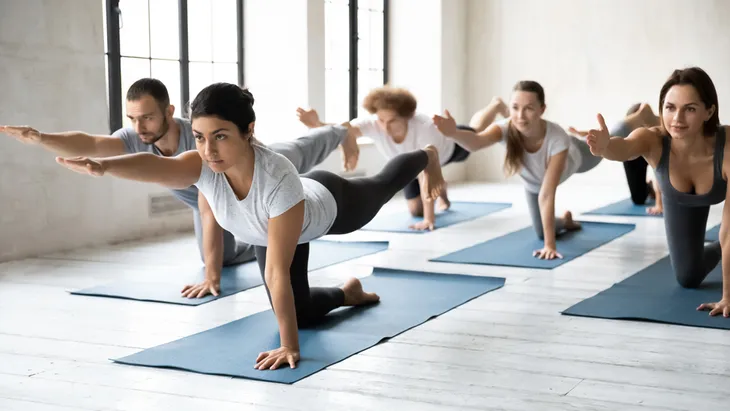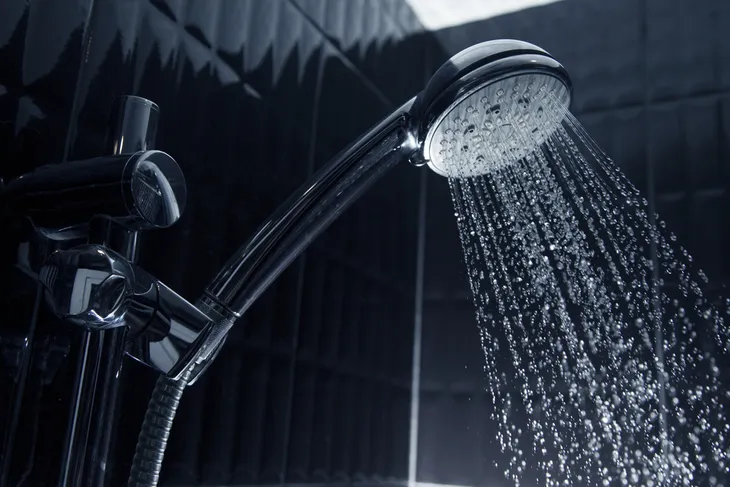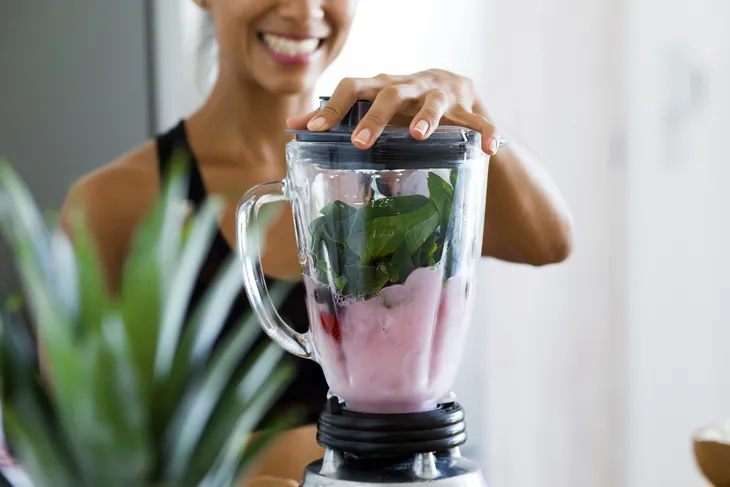When you feel a bit foggy during the day, chances are your first solution is to reach for a strong coffee or tea to get a caffeine kick. While that can give you a short-term boost, the crash from caffeine can actually make you sleepier and feeling more drained than you were before.
There are simple and natural ways to give yourself a boost that don’t have the potentially negative effects of caffeine—such as a racing heart rate or increased feelings of anxiety. Here are 14 ways to get a jump on your day that only requires minor changes in your habits and a bit of time out of your busy schedule…
Want diet & nutrition content delivered straight to your inbox? Sign up for our exclusive diet & nutrition newsletter!
Get A Bit of Exercise
While it may seem counterintuitive when you’re feeling tired, going for a brisk walk or doing some cardio at your desk will actually give your system a reboot. The Mayo Clinic actually recommends exercise as a way to deliver more oxygen to your body and help improve blood circulation and heart efficiency.
The exercises don’t have to be complicated or difficult. In fact, doing some push-ups or even jumping jacks can get your blood flowing faster almost instantly. Even simple stretches can help you feel more energized without a lot of effort.
Drink Some Cold Water
This may seem a bit too simple to be effective, but many people forget that the simple act of drinking a glass of water can have many positive benefits when feeling sluggish. Cold water is even better, according to a 2014 article from the Huffington Post, which notes that cold water can actually trigger an adrenaline response and increase blood flow to your brain.
While a glass of cold water can get you moving during the day, the Huffington Post article recommends drinking water first thing in the morning in lieu of coffee for a natural kickstart. But be wary of drinking ice water with a meal—experts believe cold water could slow digestion, making your body work harder and using up more of your valuable energy.
Take a Cold Shower
Instead of putting cold water into your body, you can opt to pour it over your head as a way to wake up. Forbes Magazine says a cold shower is one of the best ways to increase energy to tackle a workday. The same article also notes that alternating between warm and cold water (and ending on a freezing cold note) causes blood to be directed inwardly to your vital organs.
While taking a cold shower at work is not a luxury everyone has, splashing some very cold water on your face can have similar effects and quickly make you more alert. Keep in mind that splashing cold water on the face and body can also help alleviate stress.
Natural Sunlight Exposure
Most of us bask in artificial lighting while we’re at the office, which is not the friendliest environment to optimize alertness or mood. A NHI study featured on The National Centre for Biotechnology Information website notes that subjects exposed to natural lighting conditions during the day felt more alert and had higher cognitive functions in the early evening—compared to those exposed to mainly artificial light.
The study concluded that even a short time in sunlight would make a difference in mental function as opposed to dim office lighting. So open those blinds at work, or use your lunch break to take a short walk outside instead of chugging back an extra coffee at your desk. Deeply breathing in fresh air will also help you feel more relaxed and energized.
Eat a Protein-Rich Snack
If you’re really busy at your desk and don’t have time for a walk, you can enjoy a light snack while feeding your body some high-octane fuel. Nuts, yogurt, fruit, and even a nibble of dark chocolate (low in sugar) can boost your brain function without the heavy crash that comes from sugary drinks or candy bars.
Eating foods such as chips and candy that are high in calories without the metabolism-boosting benefits can have long-term health impacts such as weight gain, according to the Centers for Disease Control and Prevention. The CDC explains that foods with a lower “energy density” such as fruits and vegetables actually help to increase nutritional value and effectively control hunger. This is because they have less fat and more fiber than high-energy-density foods.
Listen to Up-Beat Music
If you find your snack drawer empty or don’t have time to do a few exercises to get through the afternoon, why not dial into the power of music? Many workplaces allow headphone use at your desk, so slap those on to avoid distracting others and take in those energy-boosting beats.
Scientific American notes in a 2013 article that while listening to music is great for motivation during exercise (you can combine music and one of the methods above for an enriched experience), you can elevate your mood with your favorite tunes. A higher-tempo song may even make you want to wiggle in your chair or get up and boogie, and you’ve already read how exercise can increase energy!
Sniff Peppermint
A good stiff mint can sometimes shake the cobwebs off during the long afternoon hours, but apparently sniffing peppermint is even more effective at keeping you focused when you need it most, according to an article from IOL.
In particular, sniffing peppermint (or cinnamon) can help you stay alert when you’re behind the wheel, which is a particularly important time to be focused. The article cites research from West Virginia that suggests getting a noseful of “pleasant” odors periodically while driving can help lessen the chance of getting into an accident and even developing road rage.
Take a Power Nap
Sometimes, a little sleep can go a long way in powering you through the day and increasing your level of alertness. WebMD says a nap is your friend to stave off sleepiness but warns a long nap can have unwanted results.
“There are two things to remember about naps: Don’t take more than one and don’t take it too close to your bedtime,” says the source. It suggests napping for as short as 5-minutes, but no longer than 25-minutes. Also, make the nap at least 6-hours before your usual bedtime, it adds.
Roll Your Eyes
We’re not talking about the teenager-type rolling of eyes, like when you ask your teen to take out the trash or clean the dishes. RodalesOrganicLife.com has 5-ways to wake up your tired eyes through coordinated eye movements and exercises.
The source points to a study by the Vinod Shende of Mahatma Gandhi Institute of Medical Sciences that says breathing techniques (we’ll get to that one) and ocular exercises can improve both hand-eye coordination and concentration. The exercises include vigorous blinking, near and far focusing, eye shifting, and others. This could help keep your eyes wider even as the clock hits 3 p.m. at the office. Oh, and look away from the screen once in a while to give your eyes a break.
Talk to Someone
Engaging in conversation can keep the sleep from setting in, notes Lifehack.org. It suggests talking to a friend or work colleague and trading funny stories, discussing a business venture or creative idea, or even debating “the latest political scandal.”
The key is to practice “mindful listening” to what the other person (and yourself) is saying, by tuning into the “tone, volume and content of the conversation,” it adds. Meaningful conversation can act as a kind of stimulant for the mind.
Pack in a Healthy Breakfast
Aside from the protein-rich snacks we’ve mentioned, you should always start your day with a healthy breakfast. We know you were probably nagged about eating breakfast as a kid, but it turns out your parents were on to something.
Prevention.com says certain breakfasts can “give your brain a boost,” and provide the energy to make it to lunch. Suggestions from the source include a yogurt parfait, egg sandwich, berry-banana smoothie with toast, cereal with peaches and milk, and a delicious-sounding breakfast quesadilla.
Breathe Deep
WebMD says taking in more air can keep you alert longer. That’s because deep breathing raises your blood oxygen levels, which lowers blood pressure and improves circulation – in turn, “ultimately aiding mental performance and energy,” it adds.
Deep breathing engages your abdomen, not your chest, the source points out. Sit up straight at your desk and place one hand on your belly just below the ribs, and the other on the chest. “Inhale deeply through your nose and let your belly push your hand out. Your chest should not move,” it adds. Breathe out through pursed lips, using your hand on your belly to help push air out if you choose.
Alternate Tasks
The same source says staying on one task too long can start to make your mind wobbly, so switch it up periodically. WebMD cites a study by Finnish researchers that shows working a 12-hour night shift involving repetitive work “is as harmful as sleep loss for alertness.”
The source says you should reserve “stimulating tasks” for your sleepiest times whether at work or home. If you’re feeling like falling over, switch your focus to something more engaging to give your system a boost, it adds.
Chew Gum
While this is generally considered a bad habit and not the best for your teeth, especially if it’s a sugar-coated variety, but BusinessInsider.com says keeping your mouth busy seems to have a similar effect on the mind. To keep with the “natural” theme, you can choose an all-natural gum available in some stores.
It says some studies have suggested that chewing gum can be “an effective way to reduce daytime sleepiness,” as the act of chewing itself may increase circulation and therefore keep certain parts of the brain activated. Other studies have shown chewing gum can be beneficial if you’re writing an exam or reading. “Just make sure you’re not smacking your gum too loudly if you’re around coworkers,” it says.

















